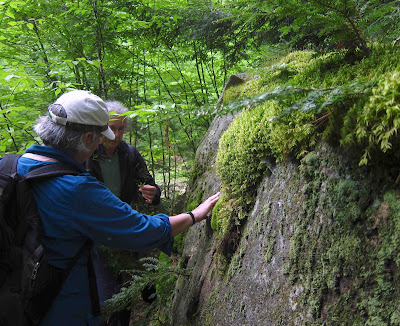What's a calcareous talus slope? Well, it should be a steep slope where blocks of limestone or dolomite have broken off and tumbled down a mountainside. According to documents in the Moreau Lake State Park's Master Plan, there's a stretch of these rather rare kind of geological formations on the Warren County side of the Hudson downstream from Lake Luzerne, just before the river takes a sharp bend to the northeast to head toward Glens Falls. That's where Sue and Evelyn and I went today to explore the woodlands that grow on just this kind of substrate. But we aren't quite sure we found it.

To be sure, there were chunks of rock lying in heaps on a steep wooded slope, but the rocks looked like granite, not limestone, and most of them looked as if they had broken in place, like the ones in this photo, rather than having tumbled down a mountainside. Also, we found here some Pink Lady's Slippers, which prefer acidic soils, not limey ones. Maybe we were in the wrong place.
But never mind. It sure was a beautiful place, with ferns of many kinds proliferating under stands of White Pine.
We followed a trail that led into a woods that was almost completely Hemlocks. Here, Hemlock pollen had dusted the forest floor with a pale yellow cast, revealing the sheet webs of ground-dwelling spiders. They looked like a litter of doilies laid out in the woods.
I peered down into the hole of one, expecting to see its owner at home, and I wasn't disappointed. As soon as I touched the edge of the web, this little spider darted forth and took up its stance on the surface of its web. (You might have to click this photo to see it, since the spider, too, is dusted with yellow pollen and blends right in.)
A Hemlock woods can be dark and creepy, especially when you come face-to-face with monstrous burls like this one.
After a while, we moved from the dense dark Hemlocks into the greener, airier light of a mixed hardwood forest. We found stone walls where a road had long ago been cleared, and we also discovered sure evidence of once-upon-a-time human habitation. Near by this old foundation were the remains of what once was a well.
We found many fungi, including this grey-and-white stuff circling the base of a rotting stump. Of course, there is nothing that looks like this in any of my mushroom books.
I did find Brown Cup Fungus in my books, though. As well as along our trail today.
But here was THE FIND of the day: Showy Orchis. Such a lovely little plant. But hardly "showy." Evelyn recognized the leaves first, then searched until she spied a few in bloom. Well, here was some evidence of calcareous substrate at last, since Showy Orchis will only grow in a limey woods.
As we rounded the bend of the river and found a road that led us out of the woods and back toward our car, we came upon these giant anthills, crowned with Hay-scented Ferns.
On either side of the road, stretches of bedrock and heaps of boulders were covered with many different kinds of mosses, lichens, and liverworts. Lucky for Sue and me, we had an expert teacher in the person of Evelyn along.











3 comments:
I thought of you today, while looking for a common yellowthroat in the research site (by Skidmore), I sat down on a rock face to rest, looked behind me for my bag, and spotted in the corner of my eye, about a dozen pink lady's slippers! They were in perfect shape, my guess is my fellow research participants either saw them and took care not to trample, or they're far enough back in the tree-line to miss. By the way, I'm now living on Skidmore's campus until mid-July!
This post of yours shows one of my most favorite things about Moreau Lake - those random old walls!
Exploration is always exciting, even if the limesone talus is illusive. A good reason to return? That showy Orchis was quite a find, and that old cellar sure has a limestone look. Reminds me of a song by Adirondack folk singer Dan Bergren -- something like...
Was it so long ago
People worked and died for a living,
Leaving logging roads, graveyards and old cellar holes.
Finds like that make me wonder about the people who lived there. Evidence of people who lived on and from the land add another dimension to the wonders to be found in the woods. Thanks for sharing.
Hi, Lindsey, good to hear from you. I'll bet you were on the north side of Daniels Road when you found those Pink Lady's Slippers. In the woods closer to campus the soil conditions are very different, and only Yellow Lady's Slippers grow there. I'll bet you feel like you're in birders' heaven, living there near the Skidmore Woods.
Thanks for your comment, Wayne, and the snatch of Dan Bergren's song. Yes, coming upon those old foundations does cause one to wonder who lived there and why. I saw a presentation on the building of Spier Falls Dam, and the old photos showed farms and houses all along the Warren County side of the Hudson where it has now returned to forest.
Post a Comment